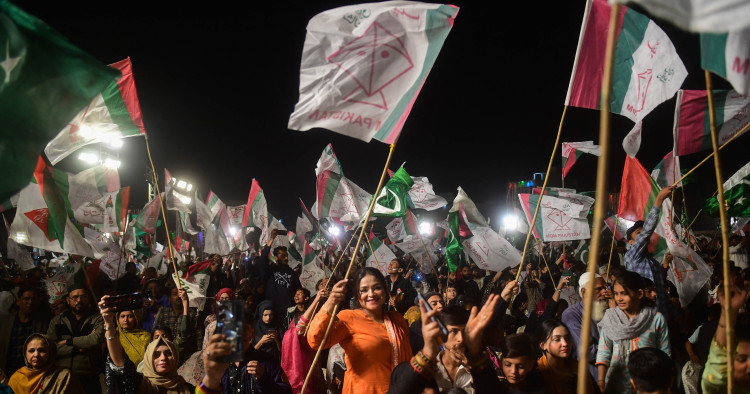Contents:
- Pakistan’s national election results shake the nation
- The Biden administration continues its diplomatic efforts as the conflict rages in Gaza
- Netanyahu’s rejectionism is here to stay, unless Biden shifts gears
- Egypt isn’t about to suspend its peace treaty with Israel — as long as it’s respected
- Iraq split on the question of ending the US mission against ISIS
Pakistan’s national election results shake the nation
Marvin G. Weinbaum
Director, Afghanistan and Pakistan Studies

-
In last week’s long-delayed national election, Imran Khan’s PTI party overturned all expectations by taking the plurality of the vote, leaving the country possibly headed toward new, even worse political disarray and undermining what remains of the public’s faith in democracy.
-
The big loser in the election appears to be the military establishment, reflecting broad anger at its attempts to manage the election process.
The prospect that Pakistan might settle down politically after 10 months of political unrest was shattered by the results of last Thursday’s long-delayed national election. While no party had been expected to secure a majority of National Assembly seats, it was widely assumed that Nawaz Sharif’s Pakistan Muslim League-Nawaz (PML-N) would capture a plurality and have relatively clear sailing in forming a coalition government. Imran Khan’s Tehreek-e-Insaf (PTI) seemed headed for near political oblivion by the military’s muzzling of the party’s leadership and the obstacles thrown in the way of its independent-running surrogate candidates. Instead, the PTI-affiliated independents stunned the country by taking the plurality, allowing them to make claims on forming a new government. The electoral outcome has now left the country possibly headed toward new, even worse political disarray of a kind liable to undermine what remains of the public’s faith in Pakistan’s democracy.
With some 60 million out of a total of nearly 128 million registered voters participating in the election, the turnout (47%), while well above average for Pakistan, disappointingly fell below that for the last election in 2018. The voters cast ballots for a National Assembly, comprised of 336 seats (with 266 directly elected, 60 reserved for women, and 10 for religious minorities), saw contests for 266 seats, with the remainder to be allocated to parties based on their proportional representation. PTI emerged as the leading party, with 92 seats, followed by PML-N, with 77 seats. The Pakistan People’s Party (PPP) secured 54 seats, while the Muttahida Qomi Movement Pakistan (MQM-P) claimed 17 seats. With PTI officially banned, its independents are expected to adopt an approved party through which to convey their collective vote strength.
The election results appear to have divided Pakistan’s political forces into two camps. One is led by PTI, possibly joined by several small parties hoping to score more than just a moral victory. This first camp alleges widespread ballot tampering and the slow release of vote tallies as evidence of post-election manipulation that denied Khan’s party dozens of seats. PTI plans to appeal to the courts and has called for peace protests. The other camp is led by PML-N, which has begun negotiations with several parties, including the PPP and MQM-P, on putting together a coalition government. Of the two alignments, that headed by PML-N probably has the clearer path to succeed in cobbling together the 169-seat majority needed to form the next government.
The big loser in the election appears to be the military establishment. The same results at the voting booths that have provided a measure of imprisoned Imran Khan’s wide popularity also reflect the public anger at the military and its attempts to manage the election process. Not since 1970, with the Army’s loss of East Pakistan, has the military been put so much on the defensive. Last week’s vote can be taken as a rebuke, particularly of Army Chief Gen. Asim Munir and the senior command, which has engaged with Khan in exchanging unprecedently bitter personal attacks. Yet if PTI’s leader has any hope of gaining his personal freedom and regaining office, it will require some mending of his relations with the military establishment. For his part, a chastised Gen. Munir has urged the politicians to form a unified government, stressing that the nation needs “stable hands and a healing touch to move on from the politics of anarchy and polarization.”
Likely, Pakistan will instead see the emergence of a weak, unstable governing coalition, incapable of assuming the risks necessary to carry out the far-reaching policy changes needed to deal with Pakistan’s rapidly mounting economic, social, and environmental problems. Moreover, whichever faction — the PTI or the PML-N — ends up sitting in opposition, most of its time will probably be devoted to harping on the government’s supposed illegitimacy and in demanding new elections. If so, the 2024 national election could be another blight on Pakistan’s already sullied democracy.
Research assistant Naad-e-Ali Sulehria contributed to this piece.
Follow: @mgweinbaum
The Biden administration continues its diplomatic efforts as the conflict rages in Gaza
Brian Katulis
Senior Fellow for U.S. Foreign Policy and Senior Advisor to the President

-
CIA Director William Burns travels to the region for negotiations a few days after Secretary of State Antony Blinken’s visit failed to achieve major progress.
-
The fact that the United States has achieved little when it comes to its short-term goals toward ending the Gaza war raises the question of how realistic is the Biden team’s long-term vision for a two-state solution and more regional normalization accords.
The Biden administration is sending Central Intelligence Agency (CIA) Director William Burns on another trip to the Middle East this week for meetings in Cairo with Egyptian, Qatari, and Israeli officials. The agenda will revolve around the ongoing discussions for a long-term pause in the fighting and hostage releases. Negotiators are seeking to achieve a longer-term ceasefire before the start of the Muslim holy month of Ramadan in early March.
Burns’ visit comes at a critical juncture in the Israel-Hamas conflict, with Israel’s Prime Minister Benjamin Netanyahu reportedly having ordered the military to draw up plans to evacuate more than 1 million Palestinians who are now in Rafah, the southern part of the Gaza Strip.
The trip also coincides with the Biden administration’s growing frustrations over Israel’s approach to the war with Hamas. Secretary of State Antony Blinken’s fifth trip to the Middle East last week apparently did not produce any major outcomes or further progress toward the five goals the Biden administration set for itself in the early weeks of the war:
- Support Israel’s self-defense and objective of eliminating threats posed by Hamas and other groups in the Gaza Strip;
- Secure the safe return of hostages;
- Prevent a wider regional war;
- Protect civilians and respond to a growing humanitarian crisis in Gaza; and
- Maintain strong working relationships with Arab countries and others involved in managing the fallout and planning for the future.
Four months into the Israel-Hamas war, about half of the hostages held in Gaza were released in a week-long pause in the fighting in late November, and the level of humanitarian aid that reached Palestinians in Gaza may have increased as a result of Washington’s diplomatic efforts. But the overall picture in achieving the five aforementioned goals — which together are designed to hasten an end to the conflict as a whole — remains quite mixed. The United States has thus far avoided a wider regional conflict, even as it has stepped up its own military operations against the Houthis in Yemen and against a number of Iran-affiliated groups in Syria and Iraq. In addition, the hopes for increased civilian protections for Palestinians in Gaza are dashed every day, as the confirmed killing of Hind Rajab, a six-year-old Palestinian girl, shows.
Paltry policy outcomes to date have not prevented some on the Biden team from outlining more grandiose visions for a wider regional peace, including a possible Israel-Saudi normalization accord and the creation of a new state of Palestine as part of a two-state solution. Some observers have even called this broader vision a possible “Biden Doctrine.”
Diplomacy is aimed at producing outcomes that cost less than war and military conflict, and it typically seeks to shape the calculus of combatants to a conflict in coordination with military and security moves. A breakthrough could happen at any moment, or the conflict could continue to rage much longer.
The fact that it has taken so long for the current approach to achieve short-term results demonstrates how complicated the situation is at present. It also illustrates how difficult it will be to make the Biden team’s visions for a broader peace in the Middle East a reality.
Follow: @Katulis
Netanyahu’s rejectionism is here to stay, unless Biden shifts gears
Eran Etzion
Non-Resident Scholar

-
By this stage of the war, any other Israeli prime minister would have resigned, but Benjamin Netanyahu clings to power because he faces elimination in any future elections and a very real possibility of a guilty verdict in his multi-case criminal trial.
-
Netanyahu is not looking for a negotiated agreement to end the war and is determined to extend it as a means to ensure his political survival; the Biden administration’s tolerance of this behavior helps the Israeli leader keep it up.
Israel’s longest-serving prime minister, Benjamin Netanyahu, is less than a lame duck, according to all public opinion polls. The Oct. 7 massacre left Netanyahu with nothing but his staunchest base of supporters, some 25% of the Israeli electorate. By this stage of the war, after 128 days, any other Israeli head of government would have resigned, been dismissed by the Knesset, or thrown out by the voters. But Netanyahu clings to power as if his life depends on it. In fact, he faces elimination in any future elections and a very real possibility of a guilty verdict in his multi-case criminal trial. His political life is virtually over. What’s keeping him afloat is a 64-member ruling coalition, consisting of the most far-right zealots, messianic settlers, and fringe-figures he cultivated precisely for this purpose. They make up the entirety of his life-support system, standing against the vast majority of Israelis, who wish to see a different leadership.
Netanyahu manages the war effort through a two-pronged mechanism of his own design. First is the so-called “war cabinet” — a very small forum, lacking any statutory authority and comprising only three members with voting rights, including himself and the nominal opposition leader, Benny Gants, along with three “observers.” Second, he manages the war via the “regular” cabinet, which retains all of its formal statutory powers but has been stripped of its real responsibilities; it remains largely comprised of a collection of ultra-rightists, ultra-orthodox, and ultra-populists. The prime minister navigates between the two bodies, doing what he does best — eschewing responsibility, assigning current and future blame, avoiding undesired decisions, and maximizing his political utilities at the expense of Israel’s national security. This is not only the opinion of some key members of both cabinets but also of the United States administration as well as many international and regional interlocutors. And most Israelis, including many of Netanyahu’s previous supporters, feel the same way.
So it should have come as no surprise that he swiftly rejected the latest negotiated draft on a cease-fire in Gaza, which US Central Intelligence Agency (CIA) director Willima Burns, Israeli Mossad head David Barnea, and their Egyptian and Qatari colleagues put together with great effort at a meeting in Paris, as well as heavily criticized Hamas’ official response to the document. Netanyahu is not looking for a negotiated agreement to end the war. He is determined to extend the war as a means to ensure his political survival. As part of this, he is leading a campaign against those who wish to bring about a quick hostage-release agreement, or a more comprehensive outline, as proposed by the US administration. How long can he continue to play this cynical game? For at least as long as President Joe Biden tolerates it.
Follow: @eranetzion
Egypt isn’t about to suspend its peace treaty with Israel — as long as it’s respected
Mirette F. Mabrouk
Senior Fellow and Founding Director of the Egypt program

-
Egypt has fortified its borders with Gaza in case millions of desperate Palestinian refugees suddenly try to make their way or are forced across the border.
-
The country is attempting to balance its adherence to an existing peace treaty on the one hand with Israeli military action across the border and an overwhelmingly pro-Palestinian public at home on the other.
William Burns, the head of the United States’ Central Intelligence Agency (CIA), heads to Cairo on Tuesday to meet with a Who’s Who gathering of players involved with or trying to resolve the Gaza conflict: Egyptian Intelligence Chief Abbas Kamel, Qatari Prime Minister Sheikh Mohamed bin Abdulahman Al Thani, Mossad Director David Barnea, Shin Bet Director Ronen Bar, and Gen. Nitzan Alon, who heads the Israel Defense Forces' (IDF) hostage-retrieval efforts.
They will try to find a way to de-escalate the conflict after the last cease-fire proposal, presented by Hamas and ironed out by Egypt, Qatar, and the US in Paris, had been flatly rejected by Israeli Prime Minister Benjamin Netanyahu as “delusional.”
Al-Jazeera maintains a live tracker that updates the carnage: In the initial terrorist attack by Hamas, 1,200 Israelis were killed and 240 taken hostage. In retaliation, Israel has subjected Gaza to a relentless campaign that has so far killed over 28,730 Palestinians. Of those, an estimated 8,300 are women and 12,150 are children. Over 75% of Gaza’s entire population has now been herded by Israeli bombing toward the southern border with Egypt, to the town of Rafah. The lack of food, water, and power has led to conditions described by United Nations agencies as “unprecedented levels of near-famine like conditions.” The tensions have been further heightened by Netanyahu’s announcement of an impending ground invasion of Rafah despite myriad international warnings against such a move since Gazans have nowhere else to go.
The move has also sharply ratcheted up tensions between Egypt and Israel.
Egypt has been very clear about its refusal to allow Israel to push Palestinians over its border into Sinai. It isn’t a matter of hosting more refugees; the country already hosts over 9.5 million refugees who are fully dispersed throughout the country. However, Egypt, along with every other Arab country, has, since the start of the conflict, stringently rejected any attempt to forcibly expel Palestinians. Displacement aside, for Egypt, the possibility of Hamas combatants on its territory continuing to fight Israel is a major security risk. However, while Israel has officially dropped its initial demands that Palestinians move into Egypt, it has continued to drive them to the border, setting up a de-facto likelihood of over a million desperate refugees pouring across. In response Egypt has fortified its borders with Gaza, bolstering security as well as moving tanks and armored personnel carriers to the Egyptian side of Rafah. Just as importantly, it has sent pointed signals to Israel that its borders are a literal, rather than figurative red line.
There has been a growing sense inside of Egypt that the country is being taken for granted.
Officially, Egypt is extremely committed to the Camp David Accords, the region’s watershed peace treaty with Israel. Egyptian Foreign Minister Sameh Shoukry recently reiterated his country’s commitment to peace with Israel while politely lambasting Israel for what Egypt has consistently described as a deliberate policy of impeding aid flows into Gaza. However, the strain of attempting to hold together a diplomatic treaty in the face of unbridled conflict is starting to show. Repeated remarks by Netanyahu on taking control of the Philadelphi Corridor, a buffer zone between Gaza and Egypt, in contravention of the peace treaty, were met with an immediate response from the head of Egypt’s State Information Service, Diaa Rashwan, who called the Israeli leader’s comments an “attempt to create legitimacy” for occupation of the border corridor. In a recent meeting in Tel Aviv, an Egyptian delegation refused to discuss cooperation on any ground invasion of Rafah. And today, two Egyptian officials and a Western diplomat reportedly “told the Associated Press that Egypt may suspend the peace treaty if Israel invades Rafah.”
Egyptian diplomatic sources say this is an imprecise analysis of the situation. Egypt will respect the treaty, they say, as long as that respect is mutual and changes are consensual. Mutual consensus, however, can be a surprisingly subtle concept to grasp, especially considering the momentum of the conflict, Israel’s complicated internal politics, and the fact that international criticism of Israel has been limited to just that — mere criticism.
The conflict has further battered Egypt’s already hobbled economy; among other consequences, Houthi attacks in the Red Sea, ostensibly triggered by the Israeli assault on Gaza, have slashed Suez Canal revenues. Just as worryingly for the government in Cairo, it has to pull off an extremely precarious balancing act: adhere to an existing and important peace treaty while taking into consideration the potential security risks and Egyptians’ overwhelmingly pro-Palestinian public opinion.
Follow: @mmabrouk
Iraq split on the question of ending the US mission against ISIS
Robert S. Ford
Senior Fellow

-
Iranian-backed Iraqi militias have resumed their attacks on US forces, while their political allies are pressing Iraq’s Prime Minister Mohammed Shia al-Sudani to terminate the US-led coalition’s mission and order the Americans out.
-
For his part, Prime Minister Sudani wants to negotiate a plan for the gradual drawdown of coalition forces while retaining a bilateral military arrangement with the US, allowing for things like continued training and maintenance of American equipment.
The future of the United States’ military mission against ISIS in Iraq is evolving along two tracks. On the ground, American retaliatory strikes against Iranian-backed militias that have killed militia members and a senior commander led the militias to announce the resumption of their attacks on Feb. 9. The following day, they launched an unsuccessful drone strike against an American base in eastern Syria. The militias’ political allies, meanwhile, are pursuing a political track aimed at pressing Iraqi Prime Minister Mohammed Shia al-Sudani to terminate promptly the US-led coalition’s mission and order the Americans out. In a special parliament session on Feb. 10 called by their ally, the acting speaker, to demand the Americans quit Iraq, the militias’ political friends were shocked at the sparse attendance. The many absences highlighted the divisions inside the dominant Shi’a Islamist political bloc about booting the Americans out as well as opposition from Kurdish and Sunni Arab political groupings. Politics in the parliament could become sharper in the weeks ahead, especially if the Iranian government weighs in heavily from the sidelines.
With parliamentary action slowed, Prime Minister Sudani wants to develop through negotiations a plan for the gradual drawdown of coalition forces. Reflecting American sensitivities, his team argues that the talks can go forward only if the militias halt their attacks. At his insistence, the American and Iraqi teams met for a new round of talks on Feb. 11 to review Iraqi security forces’ capabilities and their ability to manage the remaining ISIS threat. A report issued jointly last week by the US State and Defense departments observed that ISIS cannot launch complex attacks in or from Iraq and Syria. Instead, ISIS is in “survival mode,” conducting occasional ambushes — although not all experts fully agree with this characterization. Sudani argues that the coalition is no longer needed, but Iraq should have a bilateral military arrangement with the Americans allowing, for example, continued training and maintenance of American equipment like the Iraqi Air Force F-16s. Iranian-backed militias signal that they would not accept even the presence of such advisory and technical personnel.
The State/Pentagon report also noted that intensified militia attacks have degraded the Americans’ ability to provide support to build up Iraqi security force capabilities. Resources intended for the Iraqis instead have gone to force protection. The Biden administration has said little about the bilateral negotiations and is not rushing to depart Iraq. However, it is weighing the marginal gains from the military mission against a weakened ISIS against the serious risk of harm to US troops.
Follow: @fordrs58
Photo by ASIF HASSAN/AFP via Getty Images
The Middle East Institute (MEI) is an independent, non-partisan, non-for-profit, educational organization. It does not engage in advocacy and its scholars’ opinions are their own. MEI welcomes financial donations, but retains sole editorial control over its work and its publications reflect only the authors’ views. For a listing of MEI donors, please click here.













